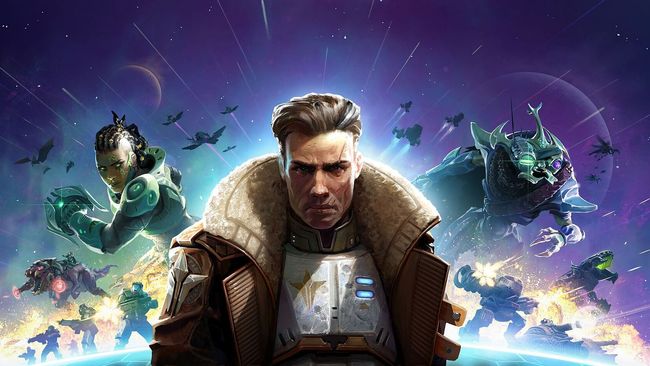Table of Contents Show
Age of Wonders: Planetfall is the new strategy game from Triumph Studios, creators of the critically acclaimed Age of Wonders series, bringing all the exciting tactical turn-based combat and in-depth empire building of its predecessors to space in an all-new, sci-fi setting.
Age of Wonders Planetfall Diplomacy Guide
Diplomacy Goals. With its war-game roots, the AoW series featured rudimentary diplomacy systems which generally resulted in you either being at war with others or in an alliance, with little in between. For Planetfall we want to take diplomacy to a new level and set the following goals:
Support Multiple Roads to Victory: Base game Planetfall offers alternate roads to victory in addition to conquering other players. In AoW3 basically every war resulted in a fight to the death. Diplomacy should help people achieve alternative victory goals, by protecting them from aggressors and achieve short- and longer-term goals through non-combat means.
Foreshadow Behavior: The diplomacy systems should clearly manage and communicate the changing disposition between players and foreshadow likely (AI) behavior like war declarations. In AoW3 wars were often declared with no forewarning and with few counter balances.
Increase Player Survivability: Keep the game fun through diplomacy even though the player might not be the ultimate victor.
Living AI Factions: The diplomacy system should make AI players and NPC factions feel like living entities through logical behavior and situational messaging.
Meaningful Trade: The diplomacy system should facilitate meaningful Trade between factions. Find peaceful resolutions to border disputes by exchanging provinces.
Non-Mutual Relations: The Player vs Player relation should be a non-mutual relation. This gets around the problem that a trespassing player would start to dislike the faction whose land he/she’s trespassing. Every player has its own view on other players. They are only connected with each other through their diplomatic state.
Expose the Diplomacy system with variables and modifier rather a black box approach with fuzzy messages. This helps people understand the mechanics behind the systems and is in line with approach taken with other game systems.
When players meet on the planet; they can start to engage in diplomacy. Diplomacy allows players to make treaties and pacts, and trade resources.
Diplomacy Interface
Through the Diplomacy interface, relations with players, NPC factions and races can be reviewed. The commander is the player representative in Diplomacy. The relationship between players is represented by their opinion and diplomatic state. Increasing these through diplomatic actions can result in mutual benefits, like allowing a call to war. Lowering these relationships can result a declaration of war. The following diplomatic actions are available in the Diplomacy interface:
- Negotiation; propose trades or diplomatic states
- Pronouncements; use influence to modify opinions
- Declaring war
Diplomatic State
The diplomatic state represents the degree of mutual cooperation between two players. Diplomatic states further affect opinions, race relations and reputation. Players can change their diplomatic states through Diplomacy.
As the diplomatic state between two players increases, they will have an increased base opinion and be able form better treaties. Additionally, it also affects their Race relation with the race of the opposing player.
The reputation of a player is affected by all diplomatic states with others. Having better diplomatic states increases reputation, where having wars or breaking a diplomatic pact lowers reputation.
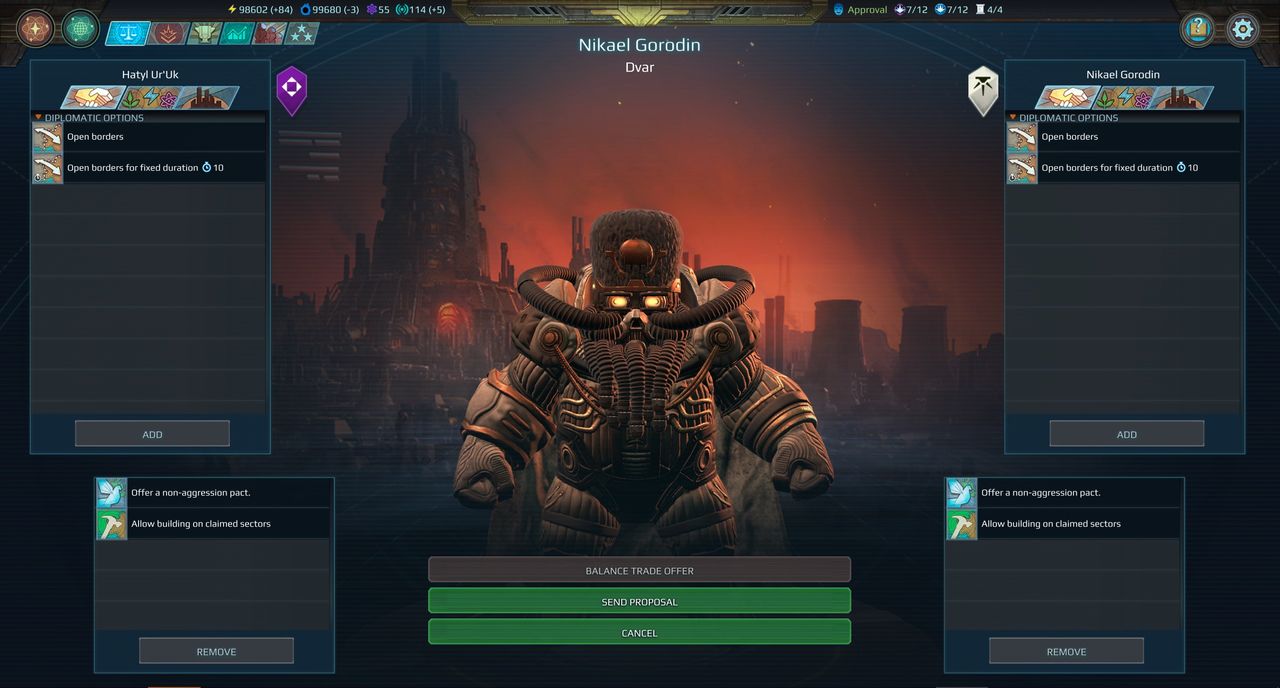
Players can share the following diplomatic states:
Alliance: An alliance is the highest achievable diplomatic state, that unlocks the ability to call the other player into any war and allows for an allied victory.
Share intelligence treaty
Allies can be called into any war
Allied victory
Increased Reputation (+150)
Increased Opinion (+400)
Increased Race relation with the race of the other player (+200)
Defensive pact: The defensive pact is the second positive diplomatic state, that unlocks additional treaties and the option to call to defensive war when in need.
Unlocks: Share vision treaty
Unlocks: Alliance
Unlocks: The other player can be called to war when waging a defensive war
Unlocks: Players now join each other in battle through the adjacent hex rule
Increased Reputation (+100)
Increased Opinion (+200)
Increased Race relation with the race of the other player (+100)
Non-aggression pact: The non-aggression pact is the first positive diplomatic state and shows peaceful intent between two players. From this state players can still declare war, but suffer a 1 turn delay before they may attack the opposing player.
Unlocks: Open Borders treaty.
Unlocks: Good Neighbors treaty (grants a player the rights to build on sectors that are claimed by another player without triggering any penalties)
Unlocks: Defensive Pact.
Increased Reputation (+50)
Increased Opinion (+100)
Increased Race relation with the race of the other player(+50)
Neutral
Is the lowest non-hostile diplomatic state and is the default state for two players that meet each other. From the neutral state, players can either improve to a non-aggression pact through negotiation or declare war without any turn delay.
While in a neutral state, players cannot have any diplomatic treaties.
War
Truce treaty
Call to war action (towards a friend)
Offer/Demand Vassalage
Request Attack, (AI ally only)
Decreased Reputation depending on the Casus Belli
Decreased Opinion towards and from the opposing player
Decreased Race relation with the faction of the other race
End Wars Using:
Forming a truce
Requesting or demanding vassalage.
Having the war expire
Vassalage (Alliance Sub-state)
A player is in a vassalage when they have declared loyalty to another player in return for stopping hostilities. When a player sees they are losing a war, they can negotiate to surrender themselves onto the other player and become their vassal in a locked pact. A player can also choose to demand that the other player becomes their vassal if they feel confident. In a vassalage, one player is the overlord and the other the vassal. During a vassalage, the players are locked into an alliance with limited diplomatic options:
- Only the overlord can break the alliance by declaring war.
- Players can no longer denounce or warn each other.
- Only the overlord may call the vassal to war, the vassal must always accept.
- Treaties cannot be broken by the vassal.
- The vassal is freed when the overlord is defeated.
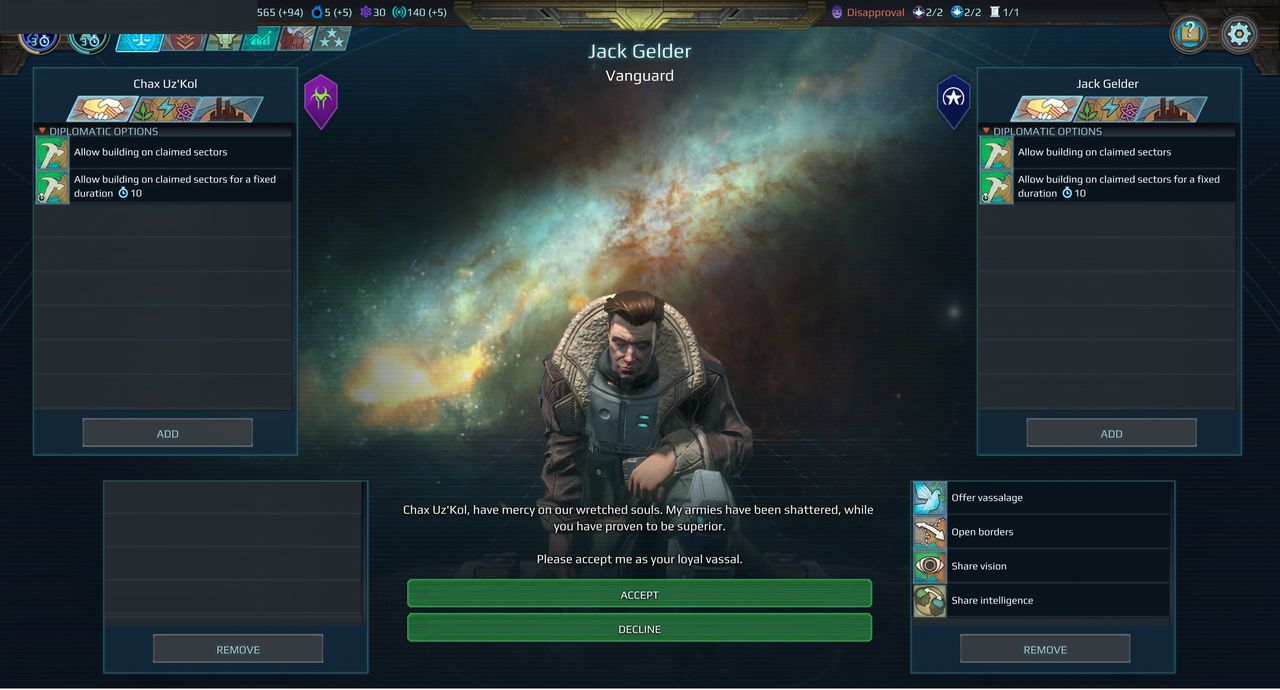
Cassus Belli
The Casus Belli and Popular Support system is about placing a penalty on unprovoked wars and about foreshadowing war. It is not about installing harsh limits on number of wars or the durations of war.
Casus Belli, or reasons for war, represent a point value that are used to denounce players and declare war on them. It is important to have Casus Belli against a player before declaring war to them to avoid high penalties in reputation and Popular Support. Casus Belli are obtained when a player is actively provoked by another player, through fabrication, or automatically by having a low reputation or race relation.
The Fabricate Casus Belli Operation is Successful!
Declaring War without Casus Belli reduces Popular Support and therefore lowers unit morale and colonist happiness. By having Casus Belli when declaring wars, the player gains Popular Support, which increases morale and happiness depending on the amount of Casus Belli.
Casus Belli are unique to each of the relations with other players. Casus Belli have a direct tie to opinions as they form a grudge which will remain active until the Casus Belli are resolved. Aside from declaring wars, Casus Belli can be resolved through negotiation.
Automatic Casus Belli are received by having a low reputation or race relation with the race of the opposing player. They can not be forgiven through negotiation, but can be used in war declarations.
Popular Support
Popular Support represents how supportive a player’s population is when they lead their empire into war. A popular player pays less unit upkeep, has high morale units and produces more happiness in their colonies. Where the opposite is true for an unpopular player.
Popular support is affected by starting wars, ending wars and the amount of Casus Belli involved:
- Declaring war without any Casus Belli leads to a high Popular Support penalty while the war lasts.
- Declaring war with Casus Belli grants Popular Support for a limited time.
When a war ends, the Popular Support gained or lost during that war is reset.
Grudge
Grudge is a point value that modifies the opinion from one player to another. Grudge is created by having Casus Belli and can only be removed by resolving the Casus Belli and not being at war.
Grudge is increased by 50 points for each Casus Belli point that a player has on another player. This Grudge is directly subtracted from the opinion.
When the players are not at war and the current grudge value is higher than the amount of Casus Belli x 50 (minimal value), the grudge will wane with 20 points per turn until it reaches the minimal value.
Race Relations
Players have relations with each of the main races, including their own. Race relations lead to both economical effects as well as diplomatic effects:
- Colonies of the race gain/lose happiness.
- Units of the race gain/lose morale.
- Camps of the race require less/more influence.
- Race Relations modify the opinion of other players of that race.
Bad Race Relations cause other players of that faction to gain Casus Belli.
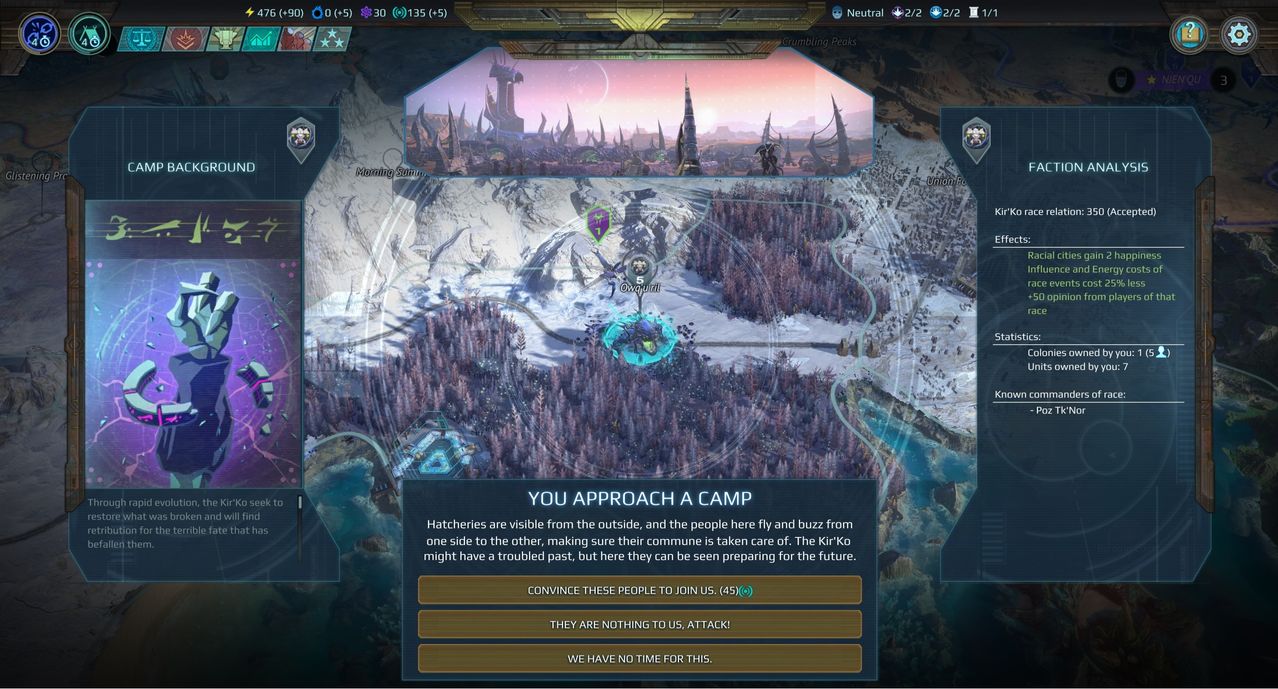
Reputation
Reputation determines the way a player is perceived by the world. It represents their actions, good and bad, as they build a new civilization from the Ruins of the Star Union. Reputation influences the opinion of other players and the costs of Dwelling shops. Having a negative reputation grants other players a Casus Belli on them.
Reputation is divided over 7 levels; each is dependent on the reputation value:
- Virtuous: higher than 600
- Honorable: 400 to 599
- Trustworthy: 200 to 399
- Neutral: -199 to 199
- Untrustworthy: -399 to -200
- Dishonorable: -599 to -400
- Deplorable: lower than -600
Reputation Modifiers:
- Changing Diplomatic State (e.g. declaring war)
- Trespassing
- Razing a colony
- Migrating a colony
- Completing quests
- Fabricating Casus Belli
- Responding to NPC faction demands
- Handling outpost events
- Offering gifts in a trade
- Denouncements
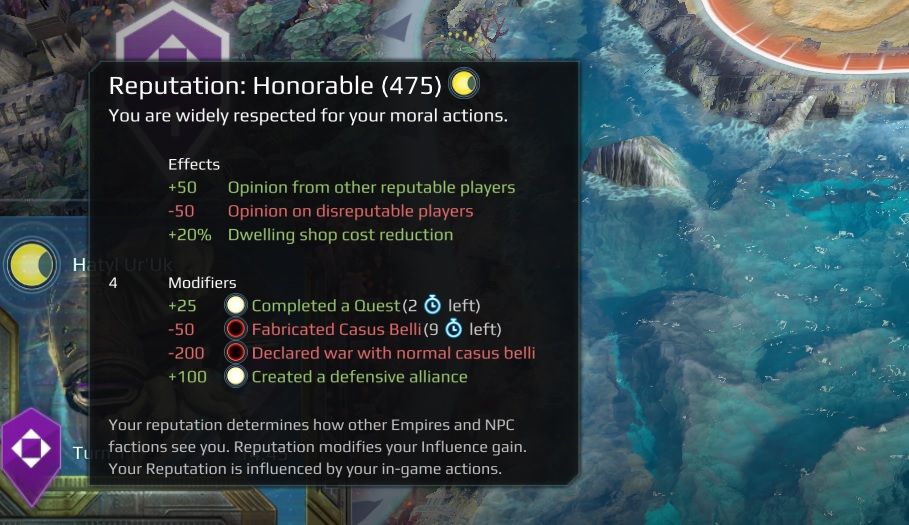
Opinion
Opinion represents how a player empire views another and affects player’s actions towards each other. It is non-mutual and is unique for each relation. Opinion is used by AI controlled players to determine the diplomatic actions they should take.
Most diplomatic actions affect the opinion of the population, like pronouncements and negotiations. Increasing the opinion can result in beneficial negotiations while decreasing it could eventually lead to wars.
Interactions between players
Using pronouncements
Through negotiations
Using covert ops
Trespassing
Ignoring sector claims
Attempting a victory condition
The diplomatic state between players
The reputation of players
Players dislike other players that have a bad reputation.
Players with a good reputation like other players with a good reputation.
The grudge between players
It’s end. I hope “Age of Wonders Planetfall: Diplomacy Guide” helps you. Feel free to contribute the topic. If you have also comments or suggestions, comment us.
